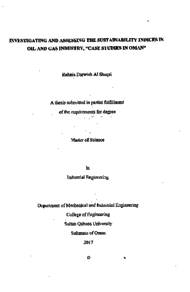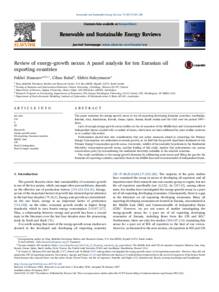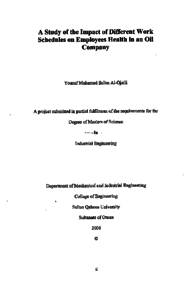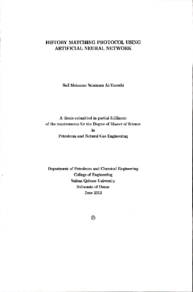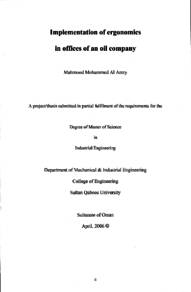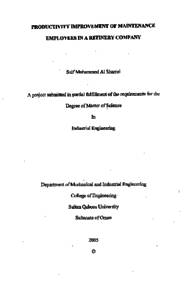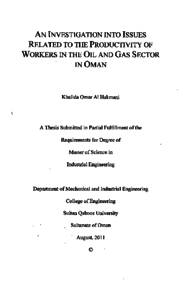Document
Investigating and assessing the sustainability indices in oil and gas industry, case studies in Oman
Publisher
Sultan Qaboos University
Gregorian
2017
Language
English
English abstract
There is an urgent need to build a sustainable future in oil and gas sector to accommodate and respond to the short-term pressures of the world environment, economic and social issues raised by the operations. One of the main issues in petroleum companies is the concept of sustainability is being interpreted in a multitude of different ways and cannot be achieved with conflicting notions of the concept at various levels. In addition, numerous frameworks and indicators have been developed to assess sustainability, but there is no agreement on a common set of criteria for analysis, assessment and investigation. After designing and modeling the framework of sustainability in oil and gas companies, results are analyzed and investigated by two important methods. The primary method (Micro-level) proposed in this thesis to evaluate and assesse sustainability index in petroleum industry is consists of three steps which are normalization, relative weight calculation and indicators evaluation (benchmarking). Then, sustainability index have been investigated and assessed in different levels (aspects, pillars, micro-level and macro-level). An implementation of the suggested framework will be applied on three case studies in Oman. The results have been used in larger scale which the secondary method is called "Macro-level" of sustainability. The results shows that B and C companies' sustainable indices are assessed as fair but it is still far from the target. Company A is more sustainable then companies B and C. Sustainable development index in the macro-level of oil and gas sector in Oman assessed to be (63.31%) which is fair but it is still far from the target. In general, the root cause of this result is the economic dimension in oil and gas sector. It is a big challenge to the companies to be fully sustainable and manage risks in business but they can increase their work on safety and reliability of operations to protect the welfare of workforce and the environment and local communities.
Description
Thesis
Member of
Resource URL
Arabic abstract
هناك حاجة ملحة لبناء مستقبل مستدام في قطاع النفط والغاز لإستيعاب الضغوط القصيرة الأجل التي تعرض لها البيئة العالمية والقضايا الإقتصادية والإجتماعية التي تثيرها العمليات والإستجابة لها. واحدة من القضايا الرئيسية في شركات النفط والغاز هو مفهوم الاستدامة حيث يتم تفسيرها بعدة مفاهيم وطرق، ولا يمكن تطبيق الإستدامة بشكل فعال في ظل المفاهيم المتعارضة على مختلف المستويات. بالإضافة إلى ذلك، توجد أطر ومؤشرات عديدة لتقييم الاستدامة، ولكن لا يوجد إطار موحد ومشترك لاعتماده في معايير التحليل والتقييم والتحقيق. تم تصميم ونمذجة إطار للإستدامة في شركات النفط والغاز، وتم تحليل النتائج والتحقق منها بطريقتين هامتين. إن الطريقة الرئيسية المقترحة في هذه الأطروحة لتقييم وتحقيق مؤشر الاستدامة في صناعة النفط هي على "المستوى الجزئي" وتتكون من ثلاث خطوات هي التطبيع، وحساب الوزن النسبي، وتقييم المؤشرات القياس). بعد ذلك، سيجري التحقيق في مؤشر الاستدامة وتقييمه على مستويات مختلفة وهي كالآتي: الجوانب والركائز والمستوى الجزئي والمستوى الكلي. وسيتم تطبيق إطار العمل المقترح على ثلاث حالات في سلطنة عمان. وقد استخدمت النتائج على نطاق أوسع، وهو ما يعرف بالطريقة الثانوية المستوى الكلي" للإستدامة. وتبين النتائج أن المؤشرات المستدامة للشركتين "ب" و "ج" تعتبر منصفة ولكنها لا تزال بعيدة عن الهدف. الشركة "أ" هي أكثر استدامة ثم الشركتان "ب" و "ج". مؤشر التنمية المستدامة على المستوى الكلي لقطاع النفط والغاز في سلطنة عمان تم تقديره ليساوي ( .3163 (% وهذا يعتبر معتدل ولكن لا يزال بعيدا عن الهدف وبصفة عامة، فإن السبب الجذري لهذه النتيجة هو البعد الإقتصادي في قطاع النفط والغاز. حيث أن التحديات الكبيرة التي تواجهها الشركات أن تكون مستدامة تماما وأن تدير المخاطر في مجال الأعمال التجارية، ولكنها يمكن أن تطور من عملها على سلامة وموثوقية العمليات وذلك من أجل حماية البيئة والمجتمعات المحلية والإقتصاد العالمي.
Category
Theses and Dissertations

